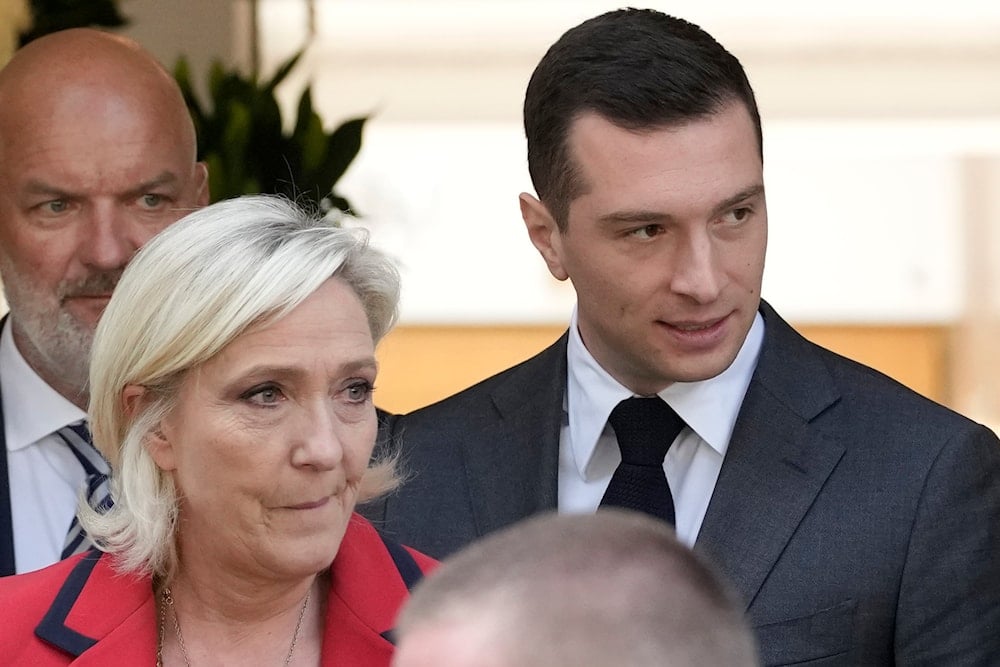French far-right set to sweep polls yet again in second round
The French parliamentary election's second round is set to be dominated by the far-right, following in the footsteps of the first.
-

Far-right National Rally party president Jordan Bardella, right, leaves with far-right leader Marine Le Pen after a press conference, June 24, 2024, in Paris, France. (AP)
France went to the polls on Sunday for the second round of a pivotal election expected to position the far-right as the dominant force in a divided and paralyzed parliament.
President Emmanuel Macron had called the snap elections three years early after his party suffered a severe defeat in June's European parliament vote, a gamble that appears to have misfired.
Marine Le Pen's National Rally (RN) emerged as the frontrunner in the June 30 first round and is on track to maintain this lead in the runoff, though that does not essentially mean that they would garner an absolute majority that would require the President to appoint RN party leader Jordan Bardella as Prime Minister.
However, a split parliament with a substantial eurosceptic and anti-immigration faction could diminish France's international standing and challenge Western unity at a time when the collective West is skewing more right-wing by the day.
Working to prevent an RN majority
Last week, over 200 tactical-voting pacts were formed between center and left-wing candidates to prevent the RN from achieving an absolute majority. This effort has been likened to the "Republican Front" of 2002, which united against Marine Le Pen's father, Jean-Marie Le Pen, when he faced Jacques Chirac in the presidential runoff.
Opinion polls suggest that although these pacts will cause the RN to fall short of the 289 seats needed for a majority in the 577-seat National Assembly, it will still become the largest party.
This prospect might allow Macron to form a broad coalition against the RN and keep Gabriel Attal as a caretaker prime minister. However, it could also lead to prolonged political paralysis in France.
"Today the danger is a majority dominated by the extreme right, and that would be catastrophic," Attal warned in a final pre-election interview with French television on Friday.
Questionable decision
Many in France are puzzled by Macron's decision to call a snap election that could see the RN double its parliamentary presence while his centrist MPs are halved.
Final opinion polls from Friday projected the RN to win between 170 to 210 seats, followed by the left-wing New Popular Front (NFP) coalition with 145 to 185 seats, and Macron's centrist alliance with 118 to 150 seats.
Although the NFP is expected to perform better than Macron's Ensemble alliance, it remains a fragile coalition of various factions, including traditional Socialists and the hard-left France Unbowed (LFI) led by Jean-Luc Melenchon.
Analysts from the European Council on Foreign Relations (ECFR) warned that even if Macron retains control, legislative gridlocks could weaken France's influence on the European and international stage.
This comes as the incumbent president vowed to stay in office until the end of his term in 2027 when he has to step down in an election that will see Le Pen making her fourth attempt at the Elysee Palace with her best odds to date of getting in.
The voting system
Parliamentary elections take place every five years, utilizing a two-round voting system. The elections determine the members of Parliament to form the total 577 constituencies of the National Assembly, the lower house of the French Parliament.
Marine Le Pen’s far-right RN party and its allies filled 39 of the 76 elected seats in the first round of the elections, leaving 501 seats remaining.
Sunday’s voting ends at 6 pm local time in towns and small cities and 8 pm in big cities. According to Reuters, pollsters will provide an initial projection of the election outcome at 8 pm, which is often a reliable indication since they are based on partial results from polling stations that closed earlier.
Vote counting is generally quick. However, given the potential tight results with an unclear majority, the final results may only be announced on Monday morning.

 4 Min Read
4 Min Read








